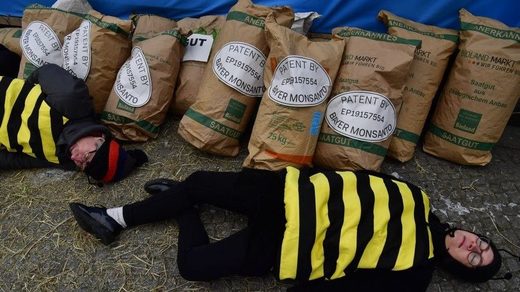
© AFP / John Macdougall
While it lacks the same Hollywood punch as an asteroid scoring a direct hit on planet Earth, or a tidal wave wiping out New York City,
the mass extinction of insects would be no less catastrophic to humans.
Around the world, people are beginning to ask the same worrisome question: where have all of the bugs gone? Not that anyone particularly misses the disgusting creatures, mind you, but it would be nice to know what happened to the party.
In parts of Germany, for instance, insect populations in dozens of nature reserves around the country have plummeted by more than 75 percent over the last three decades, according to a long-term
study released last year by the Krefeld Entomological Society (KES).
In another
study, released just this month, it was found that arthropods - invertebrates including insects and spiders that have external skeletons - are declining at "an alarming rate."
Focusing their investigation on Puerto Rico's lush Luquillo rainforest, the scientists revealed that the loss of this broad range of species is leading to serious "declines in the lizards, frogs, and birds that eat arthropods."
Now it doesn't take much intelligence to reckon that if the lizards, frogs and birds that live off the insects are in decline, then the animals that prey on the lizards, frogs and birds are also noticing slimmer pickings. And so on up the food chain.
For the millions of people who suffer from entomophobia, that is, a morbid fear of insects, the news of dwindling bug populations will probably make for a better night sleep. After all, who really likes creepy crawling insects? Trips to the countryside would be so much more enjoyable without the little pests crawling and buzzing around.
So it's probably no big deal if the annoying bugs start disappearing en masse, right? Well, not exactly. It may be easy to forget in our age of mass production and consumption that without those millions of annoying little pests the entire food chain would lose its primary link, throwing the entire life cycle into disarray. Needless to say, that would not be a good thing for anyone. In fact,
some scientists are predicting a 'sixth mass extinction event' is already under way.
"
Loss of insects is certain to have adverse effects on ecosystem functioning, as insects play a central role in a variety of processes, including pollination ... providing a food source for higher trophic levels such as birds, mammals and amphibians," the researchers from KES said in their report. "
80% of wild plants are estimated to depend on insects for pollination, while 60% of birds rely on insects as a food source."
The study went on to cite the economic benefits of a thriving insect world. After all, nothing gets people attention these days of runaway capitalism unless it threatens the bottom line in some way.
"The ecosystem services provided by wild insects have been estimated at $57 billion annually in the USA."
In other words, incredible as it may seem, a big chunk of the almighty American economy is grounded on bugs, and more specifically
honey bees, which pollinate an estimated $15 billion worth of crops - everything from apples to onions - annually. The tragedy, however, is that the fragile relationship between man and the natural world appears to be overloaded to the breaking point.